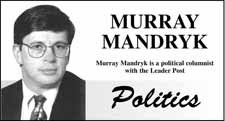By the time you read this, the Saskatchewan election campaign will be over, which is a problem for those of us who still practice the black art of writing political columns in advance.
As of the writing of this column I don't know the results of the Nov. 7 vote - although, the outcome of the 2011 campaign has never really felt like it was in doubt.
In fact, in the 28 years since I've covered Saskatchewan politics, never has an election campaign seemed so predictable. One dares venture to guess that no Saskatchewan election campaign has ever been so predetermined, but that might be overstating matters.
Premier Brad Wall's Saskatchewan Party government will be re-elected on Nov. 7. The only real question is just by how much, which will be a critical in determining what kind of government it will be. One thing that determines the quality of a government is the quality of the Opposition. Governments that feel threatened by the prospect or losing power or feel under siege by an opposition that can keep them on their toes (remember: legislative assembly funding for opposition research is largely based on the number of MLAs elected) are generally better governments.
That this election campaign might produce a very small opposition with the loss of several veteran NDP members may not necessarily be a good thing for the province. Moreover, not only does a small opposition make a big government more complacent and perhaps less vulnerable to opposition scrutiny, but also big governments create their own problems in themselves. They can become consumed by their own self-interest, like the desire of many MLAs (especially, veteran backbenchers and so-called star candidates) to be in cabinet. It's here where governments can lose focus and misplace priorities.
Rural voters, in particular, might not want a Nov. 7 landslide because they've actually had it pretty good when it comes cabinet and issue representation with the Sask. party government. With 28 of the 38 government members in the last legislature coming from ridings that are regarded as rural seats, rural voters might find themselves competing more with city voters' interests in the event of a major Sask. Party win.
But by far the biggest problem with any government that comes with a near landslide is the sense of entitlement - perhaps even arrogance - that a big election win brings. The notion that the voters have just told them that everything they campaigned on must be right and everything their opponents campaigned on is wrong and must be rejected can be a destructively powerful one.
And for as much as voters don't seem to like some the big-spending platform of that Dwain Lingenfelter based on rather nebulous potash revenue projections, a lot of NDP ideas proposed are worthy of consideration.
First and foremost would be some version of the NDP's Bright Futures Fund that would allow future generations to benefit from the one-time resources in Saskatchewan. Similarly, once this election is over, maybe it wouldn't be a bad idea if Brad Wall and company to sit down with the potash companies and talk about more equitable royalty structure. If this wasn't a conversation that the Dwain Lingenfelter could have with the private potash companies, it's surely one a less-threatening Sask. Party government can have.
And while there is no way we could likely afford to do everything in the NDP platform, attracting rural doctors, establishing rural clinics, re-instating chiropractor subsidies, more daycare spaces and twinning Hwy. 10 to from Balgonie to Regina or highways south to the U.S. border are not bad ideas.
We will have a Sask. Party government this week. But just what kind of government it will be may still depend on the election's outcome.
Murray Mandryk has been covering provincial politics for over 15 years.




